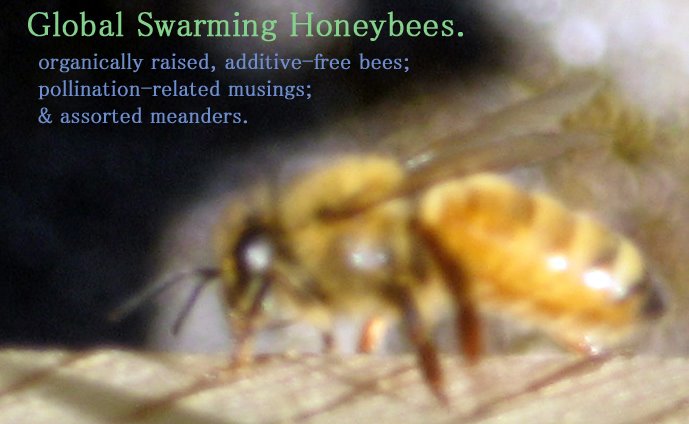Yesterday's meeting of the NYC Beekeepers Association had a great crowd and featured excellent presentations on the presence of pesticides in honey, a lively discussion of some of the issues surrounding the ongoing "mystery" of Colony Collapse Disorder, and the impressive efforts of Just Foods to make beekeeping legal in New York City (it's perfectly legal in many other U.S. cities, including Chicago and San Francisco).
You can take action to help legalize beekeeping in New York City by visiting Just Foods' Food & Farm Issues page.
And while you're at it, join forces with an exciting new group of urban beekeepers, environmentalists, gardeners, and freelance bee-lovers by becoming a member of the NYC Beekeepers Association. The organization is offering beginner workshops in urban beekeeping and an urban beekeeping mentoring program in February and March, so sign up for the e-newsletter while you're visiting the site.
1.26.2009
NYC Beekeepers Have a Great New Hive!
1.24.2009
A Haiku
Doing a bit of desperately needed office-cleanup today and found this little haiku offering, which I wrote last May:
Sunset Park subway:
A bumblebee checks me out
We see eye to eye
1.23.2009
Humans to Trees: Drop Dead
This from an article in the New York Times entitled, Environment Blamed in Western Tree Deaths:
"Rising temperatures and the resulting drought are causing trees in the Western United States to die off at more than twice the pace they did a few decades ago, a new study has found."
Of course, the environmental issues contributing to the trees' problems—drought, rising temperatures, extended summer weather—might just possibility have something to do with human behavior. So I'd have framed the headline somewhat differently; it seems the environment is being wrongly accused here.
1.22.2009
A Sanity-Friendly Presidency
Already I am delighted. Not in there two days, and Obama's already frozen publication of all the Bush administration's 11th hour attacks on our ecosystem, meaning that these rules can now be reviewed in light of a few new factors, such as science, evidence, democracy, and something other than perverse hostility toward the environment upon which our lives depend.
The move was announced today by the Center for Biological Diversity, with details provided here and here.
The Center's website also describes Sarah Palin's latest anti-environmental bitchfest (hint: this time she's going after Beluga whales).
1.21.2009
1.17.2009
More in the Ongoing Saga About Australian Honeybee Imports
The Associated Press reports a little story today headlined, "Beekeepers fear sting of imported Australian hives."
I can't pretend to possess the expertise (omniscience?) to know whether or not honeybee imports from Australia are a good idea or a disaster waiting to happen, but I strongly suspect that the USDA cannot be trusted to do a thorough job of anything, so one is hardly put at ease by reading about the "measures" they're taking to ensure a safe, appropriate process in authorizing these imports. (Anyone remember the failures of surveillance and regulatory protection surrounding the Mad Cow Disease scandal a few years back?)
Read all about it here, on the New York Times site.
1.13.2009
1.12.2009
Beekeepers/Barcelona
Wren and I will be going to Barcelona in a few weeks. Does anyone know any beekeepers in the area? We'll also be in the Priorat region. We would be delighted to meet some beekeepers and see some apiaries while we are there. Any leads are greatly appreciated.
1.09.2009
Worrisome News from Hawaii
The latest "Catch the Buzz" missive from Bee Culture brings the following depressing/distressing news to our in-box, via Honolulu Star Bulletin article by Rod Thompson:
HILO » The state Department of Agriculture is warning Big Island residents not to eat wild honey collected within five miles of Hilo Harbor during the next three weeks while it attempts to eradicate varroa mites.
The mites are tiny, spider-like parasites that infect honeybees.
Since the mites were first detected on the Big Island on Aug. 20, officials have made several unsuccessful attempts to eradicate them, said Lyle Wong, head of the state Plant Industry Division.
Following those failures, the department is now setting out 200 baiting stations with low concentrations of an insecticide called fipronil, he said.
Fipronil has been widely used since 1996 in many crop and noncrop applications, Wong said. To use it to kill infected bees, the Department of Agriculture had to declare a special 15-day "crisis exemption" from restrictions on fipronil by the U.S. Environmental Protection Agency, Wong said.
If bees near the harbor are not killed, the parasitic mites could spread to the entire island and cause a crash in the wild bee population.
In New Zealand and parts of the United States, varroa mites have caused the disappearance of more than 90 percent of wild bees.
A great deal of agriculture depends on bees for pollination. If wild ones are gone, professional beekeepers can provide services with "managed hives," but that adds cost to agricultural production, Wong said.
Commercial beekeeping in Hawaii, which includes honey production and the raising of queen bees for sale around the world, is valued at $4 million per year.




